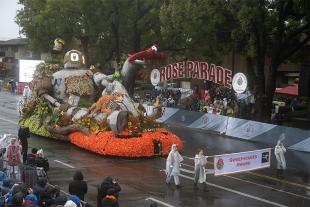'They Are Much More Engaged.' CSU Program Helps Cal Poly Students by Removing Barriers to Success

Aiden Nguyen, a third-year computer science student, was tired of hauling heavy books around campus— not to mention the financial burden of purchasing the books themselves.
But thanks to the Affordable Learning Solutions Program, those aren't an issue anymore.
“Open Educational Resources (OER) are materials used in academic courses that are in the public domain or permitted for free use,” said Anne Regan, who has led the Affordable Learning Solutions program at Cal Poly since 2019 and also is a lecturer in the English Department. “OER can vary in format, including textbooks, e-books, software, online learning modules and much more.”
To help support students and remove financial barriers to their success, the California State University (CSU) began the Affordable Learning Solutions program in the 2016-2017 academic year. The program helps faculty members across the CSU provide access to Open Educational Resources to students in their courses.
Since the start of the program, 103,544 Cal Poly students have saved over $9,875,060 thanks to instructors using OER in their courses. In addition to saving students money, instructors have been able to consistently refine their course materials.
“It’s nice to not have to carry another 15-pound book around campus,” said Nguyen.
“In piloting my OER textbook in a class a few years ago, I asked my students for feedback on the book as they were reading and working with it,” said Morgan White, a lecturer in the English Department. “This gave the students the chance to engage with the text at a deeper level, point our errors they noticed, document design principles.
“They were using technical writing concepts as they were reading a text on technical writing, so it was a really cool way to engage with the textbook itself.”
Instructors have also worked with partners on campus to bring open-sourced materials to their students.
Sara Lopus, an assistant professor in the Social Sciences Department, said, “I identified academic books and articles that had been published by the top scholars in the field. All the articles and nearly all the books were already available at no cost to our students through the university library.
“For the handful of academic books that were not yet available for free, I requested that our library acquire unlimited electronic access to the books, and they did. The whole process was very easy, and I am appreciative that our librarians were able to buy access to the books that we didn’t already have access to.”
Students have seen the benefits of OER in the classroom as well.
“My students are grateful that they have access to all the materials for free, and in turn, they are much more engaged, conversations in the classroom are more dynamic, and their comprehension of the material is exceptional,” said Sadie Johann, a lecturer in the English Department.
In 2021, to help celebrate instructors embracing these cost-saving resources, the Center for Teaching, Learning and Technology (CTLT) established departmental awards sponsored by the CSU Chancellor’s Office to recognize Cal Poly departments with the highest number of course sections using an open-source textbook and/or qualified to be designated “zero-cost course material” (ZCCM) course.
The Communication Studies Department earned the top award in the 2020-21 academic year, with instructors of 46 sections using OER or ZCCM, which benefited 1,166 students. The department received a $4,000 award and a framed certificate.
Graphic Communication won an Honorable Mention Award for utilizing Kennedy Library’s free e-texts in 31 sections for student zero course materials savings. The Graphic Communication Department received a $2,000 award and a framed certificate.
BioResource and Agricultural Engineering won an Outstanding Efforts Award for composing an original textbook and implementing it free in all 15 sections of BRAE 340: Irrigation Water Management. The BioResource and Agricultural Engineering Department received $1,000 and a framed certificate.
“Support for open educational resources at Cal Poly from our faculty members has been crucial in responding to some of the university’s most important initiatives, including the Graduation Initiative 2025 and our efforts to create a more inclusive campus,” said Cynthia Jackson-Elmoore, provost and executive vice president for Academic Affairs. “Giving every student in a course the same level of access to the course materials on day one helps to create a more equitable educational experience, while giving these students the tools to succeed.”
Visit the Cal Poly Affordable Learning Solutions website to learn more about the program and hear more from students and instructors.




